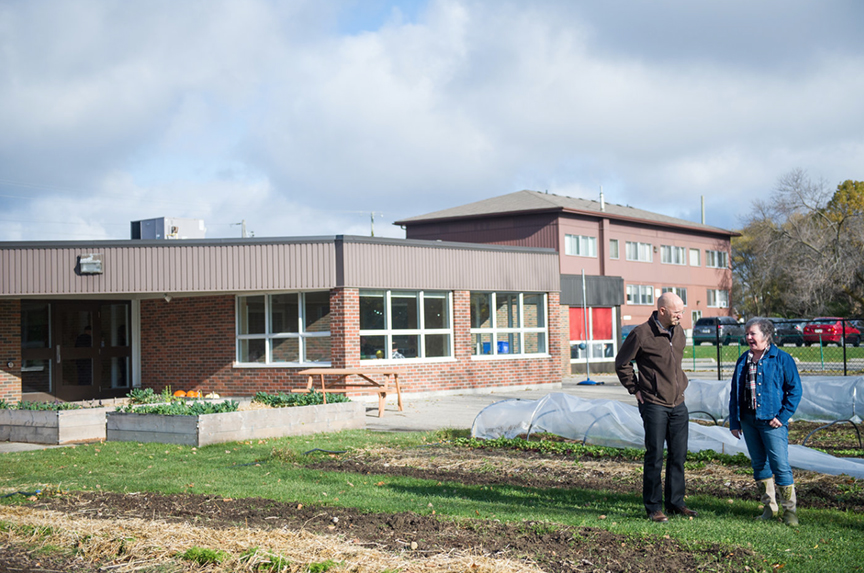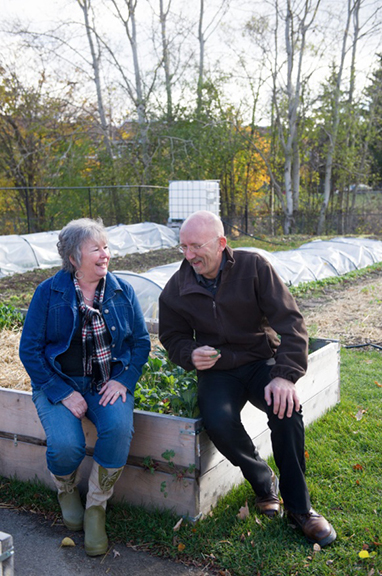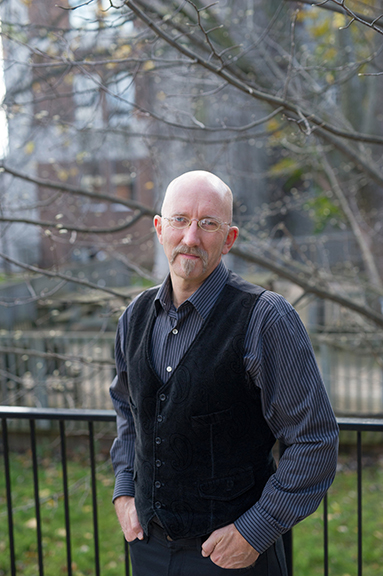The “local food” phenomena… A truly incredible happening… Resurgence of farmers markets in communities across the country, individual citizens and families committing to generate at least a portion of their own food consumption in their own backyards or condo patios, growing systems emerging that allow the hobby gardener to produce food through vertical systems that occupy windows in peoples homes, and the nation- wide phenomena of people secretly raising chickens in their backyards – secretly because most municipalities have by-laws banning the practice. So what about getting institutions involved? What about getting hospitals to grow the food they serve in their cafeterias? Universities to grow the food served in on- campus restaurants? How about in- patient care centres growing food for the centre, and having patients participate in the growing, harvesting, and processing?
Phil Mount, PhD, is the principal researcher of an OMAFRA- funded study investigating this very principle. Project SOIL (Shared Opportunities on Institutional Lands) has a mandate to assess the feasibility of institutions generating their own supply of food. It began with previous projects that assessed obstacles to local food supply in Ontario. The Toronto Food Terminal is the main point of control for all food, local and imported, in Ontario. This is convenient to all levels of the food supply chain—from producers to distributors to retailers, and of course consumers— but not the most effective or efficient way to deliver local food to local regions. A need was identified for a means to deliver locally-produced food to “large” consumers – including healthcare facilities— while keeping costs down, and returning a fair price to the farmers. That research also concluded that one of the challenges to increased local food production is the lack of access to land for new and young farmers.
 Another research project identified cost as one of the main barriers to increasing local food in health care institutions. But at the same time, it was clear that many of these institutions were rich in another resource: land. The OMAFRA funding, under the “New Directions” research program, challenged Dr Mount and colleagues to ask the question “how could we bring these resources together to encourage hospitals and other institutions to grow their own local food”? The research has focused on healthcare and educational facilities, yet their work can be easily applied across a broad range of institutions, from seniors’ residences to daycares. Virtually any facility with land is indeed an ideal candidate.
Another research project identified cost as one of the main barriers to increasing local food in health care institutions. But at the same time, it was clear that many of these institutions were rich in another resource: land. The OMAFRA funding, under the “New Directions” research program, challenged Dr Mount and colleagues to ask the question “how could we bring these resources together to encourage hospitals and other institutions to grow their own local food”? The research has focused on healthcare and educational facilities, yet their work can be easily applied across a broad range of institutions, from seniors’ residences to daycares. Virtually any facility with land is indeed an ideal candidate.
Project SOIL is actively working with five pilot sites. A major focus of the project is to demonstrate the benefits that derive from on-site food production at any scale. While the positive influence of smaller growing projects is immense, one important goal is to be able to demonstrate the feasibility of large-scale food production initiatives using lands of healthcare and other institutions. But this does not mean production is limited to facilities with large tracts of land: intensive food production practices can grow large quantities on very small plots!
The five ongoing pilots of Project SOIL are as follows:
- Homewood Health Centre – Guelph, Ontario. Homewood is a centre that treats addiction and mental health concerns. The facility has had a rich history of “therapeutic horticulture”, and are now using the newly-designed Victorian Gardens as a means of food generation, yet also as a tool to get patients moving, active, and participating in their own food production.
- Food School Farm – Fergus, Ontario. In partnership with a community non-profit—the Wellington Centre for Sustainable Agriculture—the district high school uses a century farmhouse and a one- acre garden as an intensive organic farm. A full semester, all day, integrated sustainable agriculture program for grade 11 students is conducted in the farmhouse, and students participate in the planting, maintaining, harvesting, and processing of the organic produce.
- KW Habilitation. A community organization founded by parents focused on helping individuals with developmental disabilities. The team created the “Our Farm project”, that includes gardens at an eight- acre rural site, as well as an urban site in downtown Waterloo maintained by a student group- “Young City Growers”.
- Lakehead Psychiatric – Thunder Bay, Ontario. Lakehead runs a series of social purpose training programs aimed at introducing outpatients to vocations they may pursue in the community. In the GreenWerks Gardens, clients learn planting, growing and harvesting skills. The produce is either sold in an on- site café and market, used by the foodservice provider, or sold at a discount to the Regional Food Distribution Agency, who delivers to over 40 food relief sites in Northwestern Ontario.
- Glengarry Memorial Hospital – Alexandria, Ontario. The Glengarry hospital started a therapeutic garden in 2012 as a way to get acute care and stroke rehabilitation patients up, moving, and engaged in an activity. The facility will be initiating its pilot in the spring of 2015, and will use the opportunity to start a Small Plot Intensive (SPIn) farming project.
 While a major goal of Project SOIL is to determine the feasibility of large- scale food production in public institutions, the benefits of gardening —well known to every garden enthusiast— go far beyond the simple calculation of kilos of produce harvested. The impacts of garden projects are far-reaching: it is difficult to describe the level of gratitude and satisfaction that derives from consuming a product you yourself grew. Gardens bring people and communities together, and impart a deep knowledge and respect for nature to every participant. The therapeutic impact of spending time in greenspace and working with plants —a topic recently reviewed in this journal—is supported by an impressive body of science.
While a major goal of Project SOIL is to determine the feasibility of large- scale food production in public institutions, the benefits of gardening —well known to every garden enthusiast— go far beyond the simple calculation of kilos of produce harvested. The impacts of garden projects are far-reaching: it is difficult to describe the level of gratitude and satisfaction that derives from consuming a product you yourself grew. Gardens bring people and communities together, and impart a deep knowledge and respect for nature to every participant. The therapeutic impact of spending time in greenspace and working with plants —a topic recently reviewed in this journal—is supported by an impressive body of science.
These intangibles are in no way lost to Dr. Mount and the Project SOIL team. They see first hand the value of each project going far beyond the produce harvested. It will invariably be difficult to quantify these aspects of each individual garden project they observe, yet rest assured the task has fallen into capable hands. Every member of the Project SOIL team shares one simple passion – a love of gardens! Dr Mount stressed the importance of “scale” and “value” in our interview, yet agrees defining value will be a challenge. Has a project failed if it produces 30% of the food needs of the facility in question, yet simultaneously acts as a place of healing for its residents? …or acts as a meeting place for large numbers of community members?
The “local food phenomena”, and the growing tsunami that is people’s interest in growing their own food, simply can not be stopped. Italian immigrants post World- War II are largely credited with turning every paved lot in Brooklyn, NY into tomato gardens (simultaneously dispelling the long- held myth by Americans that tomatoes were poisonous). Pre World War II, people grew vegetables in their front yards. Post world war II, it was considered a sign of affluence to grow flowers instead of vegetables, to the point where it is considered unattractive to grow food in front of your home. Yet one-by-one, front- yard vegetable gardens are making a comeback. A recent Globe and Mail article highlighted a major grocery store chain looking to convert the rooftops of all their stores into greenhouses, sighting that 50% of the cost of produce is transportation from farm to store. Toronto’s most affluent neighbourhoods house hardened criminals; families that spend thousands of dollars to build custom structures that house hens, so they can harvest a handful of fresh eggs each morning, all under extreme secrecy, in fear they will be found guilty of breaking local by-laws and their hens taken from them. At least Vancouver and a handful of other Canadian municipalities have entered the 21st century, allowing hens within the city core.
My personal love of gardening and gardens attracted me to showcase Project SOIL, yet their work goes far beyond motivating the individual to grow some veggies in their yard. Most certainly the Project’s members share such a passion, yet their vision is far more ambitious. The environmental cost of current food distribution models is horrific. We are all aware of this, as it has been a major force driving the “local food phenomena”. We often discuss major environmental problems, yet most of us feel helpless to truly make an impact. We try on a personal level to do what we can; reduce/ reuse/ recycle, car pool, walk, grow a garden. The potential impact of Project SOIL is truly immense. Project SOIL is ambitiously attempting to bring radical change to the problem. By bringing together institutional leaders and those with the passion and skills to farm their land, truly large scale food production could happen on the tens of thousands of acres of land currently covered by lawn that surrounds virtually every public institution in the country. An environmental impact of unfathomable importance has the potential to be added to the impressive list of benefits we already assign to gardens. We at IHP wish Project SOIL much success.
The Project Soil team: www.projectsoil.ca
❯ Phil Mount, Principal Investigator
Department of Geography and Environmental Studies,
Wilfrid Laurier University
❯ Irena Knezevic, Co-investigator
School of Journalism and Communication
Carleton University
❯ Brendan Wylie-Toal, Collaborator
My Sustainable Canada
❯ Linda Varangu, Collaborator
Canadian Coalition for Green Health Care
❯ Louise Quenneville, Collaborator
Hôpital Glengarry Memorial Hospital
❯ Doug Dowhos, Collaborator
St Joseph’s Care Group
❯ Chris Jess, Collaborator
Centre Wellington District High School
❯ Jenny Weickert, Collaborator
KW Habilitation
❯ Tamaura Proctor, Collaborator
Homewood Health Centre
❯ Dr. Alison Blay Palmer, Advisor
Department of Geography and Environmental Studies,
Wilfrid Laurier University
❯ Dr. Karen Landman, Advisor
Landscape Architecture,
University of Guelph









